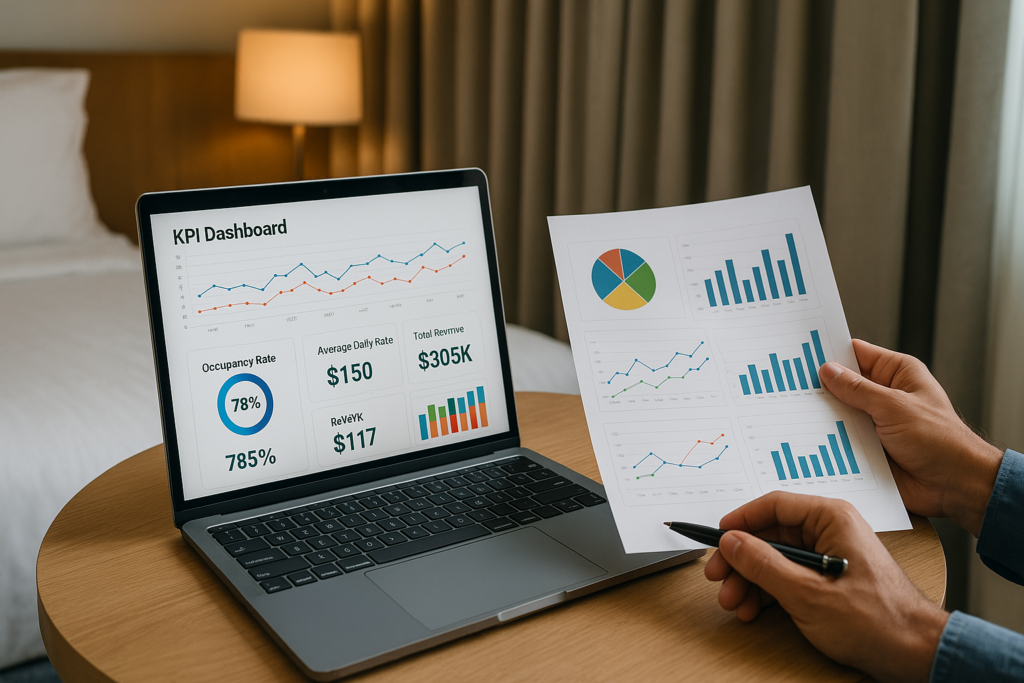Hotel KPIs: Top 10 Metrics Every Hotelier Should Track
Key Performance Indicators (KPIs) are essential metrics that provide hotel managers with actionable insights into their property’s financial health, operational efficiency, and guest satisfaction. Whether you’re running a boutique hotel or managing a large property portfolio, tracking the right hotel KPIs can make the difference between sustained success and missed opportunities.
In this guide, we break down the 10 most important KPIs for hotels, explain how to calculate them, and show how they contribute to better operational decision-making.
Hotel KPIs: Why They Matter
KPIs allow hoteliers to:
- Measure performance over time
- Benchmark against competitors
- Identify areas for improvement
- Align teams with business goals
Instead of relying on assumptions or gut feelings, KPIs offer data-driven clarity to inform every department—from revenue management to housekeeping.
Read more about:
Hotel Demand Generators: Strategies to Attract More Guests
Hotel Reputation: Strategies to Strengthen Your Online Image
Top 10 Hotel KPIs to Track
1. Occupancy Rate
Formula: (Occupied Rooms / Available Rooms) x 100
This measures the percentage of available rooms that are actually sold over a specific period. A core metric to understand demand and forecast staffing needs.
2. Average Daily Rate (ADR)
Formula: Total Room Revenue / Number of Rooms Sold
ADR indicates how much revenue you’re generating per sold room. It helps assess your pricing strategy and room profitability.
3. Revenue Per Available Room (RevPAR)
Formula: ADR x Occupancy Rate OR Total Room Revenue / Available Rooms
RevPAR combines pricing and occupancy into one metric. It’s one of the most commonly used KPIs in hotel revenue management.
4. Gross Operating Profit Per Available Room (GOPPAR)
Formula: Gross Operating Profit / Available Rooms
Unlike RevPAR, GOPPAR takes into account operational costs, giving a clearer view of overall profitability.
5. Total Revenue Per Available Room (TRevPAR)
Formula: Total Revenue (Rooms + F&B + Ancillary Services) / Available Rooms
TRevPAR includes all revenue streams, helping hoteliers understand the full value of each room beyond just lodging.
6. Cost Per Occupied Room (CPOR)
Formula: Total Room Expenses / Number of Rooms Sold
CPOR identifies how much it costs to service each occupied room, which is critical for managing expenses and optimizing margins.
7. Average Length of Stay (ALOS)
Formula: Total Number of Room Nights / Number of Bookings
A longer ALOS usually reduces turnover costs and improves operational efficiency.
8. Booking Lead Time
Formula: Average number of days between reservation and check-in
Helps forecast demand and manage revenue strategies based on how far in advance guests typically book.
9. Cancellation Rate
Formula: (Cancelled Reservations / Total Reservations) x 100
Monitoring this KPI helps hoteliers adjust cancellation policies and anticipate last-minute gaps in occupancy.
10. Guest Satisfaction Score (GSS)
Formula: Based on post-stay surveys or online reviews
Use platforms like Chekin to automate guest feedback and track satisfaction levels. A high GSS often correlates with higher loyalty and more direct bookings.
How Hotel KPIs Improve Operational Efficiency
By regularly monitoring these KPIs, hoteliers can:
- Adjust staffing levels based on occupancy
- Optimize pricing with ADR and RevPAR insights
- Lower operating costs by tracking CPOR
- Maximize guest satisfaction using GSS and review analytics
Tools to Track KPIs Efficiently
Leverage tools like Chekin to automate key processes and integrate with your PMS for real-time data reporting. With Chekin, you can also:
- Track CPOR through reduced check-in labor
- Collect GSS post-stay via automated messaging
- Manage upsells and measure their impact on TRevPAR
Conclusion
Understanding and tracking the right hotel KPIs is essential for making informed decisions that improve your property’s performance. These ten metrics offer a well-rounded view of profitability, efficiency, and guest satisfaction.
By using digital tools like Chekin and aligning your team around data-driven goals, your hotel can optimize every aspect of its operation, from guest check-in to revenue management.
If you are a tourist accommodation or hotel owner and you don’t use Chekin yet. Here is the solution to save 87% of your time and earn more with every booking
Free trial for 14 days. No credit card required!
You may also be interested in:
Google Hotel Ads Bidding: What Hoteliers Need to Know in 2025






